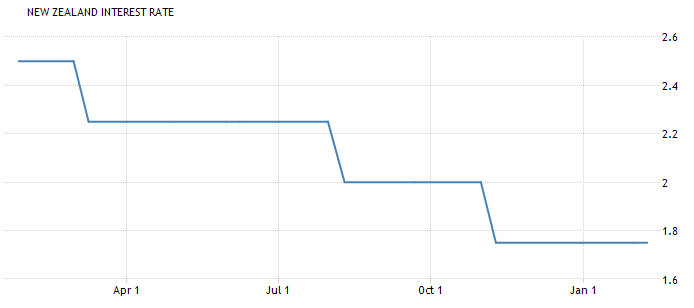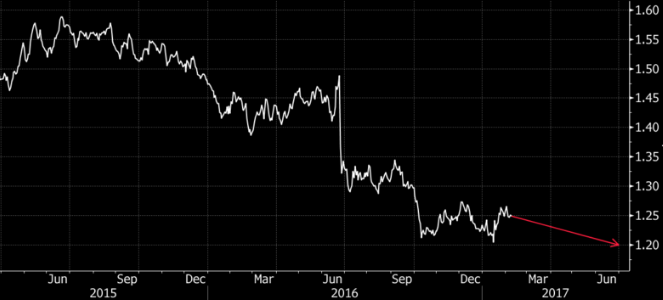Daily Insights Report 09/02/17
- 31 Mar 2017
9 Feb 2017
The Reserve Bank of New Zealand is has decided to keep the interest rate steady at 1.75% in February. This comes at a time when there is inflation pressure building as a result of higher commodity prices and a booming property market in Auckland and other cities. To counter the housing market prices, the government has limited the amount of credit available, which has shown to work.
As a result of the announcement and press conference held by the Reserve Bank of New Zealand, Governor Graeme announced that “a decline in the exchange rate is needed”. Following this, the value of the NZD fell 0.5%. Over the past year, the RBNZ has been gradually cutting the interest rate, and this can be seen in the graph below.

Since the UK’s Brexit plan has been laid out last month by the British Prime Minister, the GBP has gone up 4%. This Pound has fallen for four out of the last five days, so the prediction is starting to suggest that the Pound will weaken over time. The Pound may be weakening towards the $1.20 level by the first half of the year. If the $1.20 level is reached, it would make it near the 31 year low of seen in October.

Commodities
– Oil rose 0.3% in New York to reach $52.48 a barrel
– Copper, which is seen as a global indicator of global markets fell 0.2% in forward markets. On Wednesday, the price of copper increased 1.7%.
Japanese Yen (JPY)
Machinery Orders
This data is likely to show some growth in December because of the recent depreciation of the Yen. Business sentiment has improved as the uptick in sales shows that there is still demand for Japanese products. Statistically, machine orders tend to follow behind capital investment by six months, which Japan did not show such strong figures in. Machinery orders will likely improve in the short run, but not sustain itself in the long run. The direction of the Japanese Yen in the long term is uncertain recently, because of foreign policy decisions that might come from Washington.
Euro (EUR)
Germany – Foreign Trade
Germany’s foreign trade surplus likely expanded from EUR21.8 billion to EUR22.0 billion in December. This should be compared with last December’s value of 19.5 billion. The difference likely comes from a weaker Euro and sustained growth in China’s market. With changes in the global marketplace and trade deals changing, it is not sure what direction markets will go, especially currencies. This does not favor well with Germany which is tied to the Euro, which is facing its own problems and an upcoming controversial presidential election in France.

